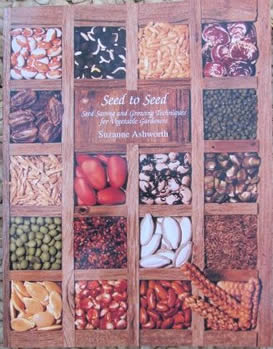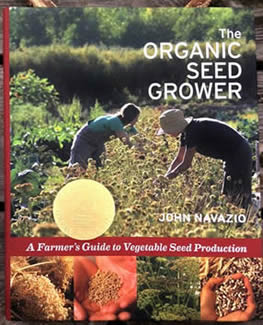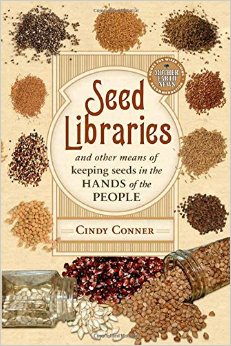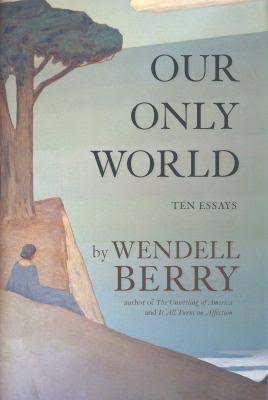Book Reviews
Review by Mary Zellachild John Navazio is a well-known plant breeder and organic seed expert. In the chapter "A Short History of Agricultural Seed," Navazio points out that until the industrialization of agriculture all farmers knew the techniques for growing the best seed from their own land. Natural selection was still the dominant factor in growing crops. Of course, this situation has changed drastically; now corporate managers, not farmers, make the decisions on where research should be directed. This has led to the majority of farmers being dependent on the marketplace for seeds and their choices becoming more limited each year. The purpose of The Organic Seed Grower is to give today's organic farmers the opportunity to reclaim the essential skill of producing their own seeds. As detailed in this book, the process of successfully growing seeds is complex, but it is described with such clear language that it should provide farmers with the information needed to start to experiment on their own. After general principles are described, the major portion of the book is dedicated to profiles of individual vegetables, covering such topics as reproductive biology, climatic and geographic suitability, soil and fertility requirements, isolation distances, growing and harvesting the crop, and a summary of seed production parameters for each of the twelve families listed. This book has been described as "a fundamental resource for the preservation and improvement of agricultural diversity." It deserves a place of honor on the bookshelf of all practicing and potential farmers. The Complete Guide to Saving Seeds: 322 Vegetables, Herbs, Flowers, Fruits, Trees, and Shrubs by Robert Gough and Cheryl Moore-Gough (Storey, 2011). Review by Mary Zellachild This book is a basic but complete discussion of seed-saving for gardeners, from plant biology to breeding your own varieties. Part one lays out the process for seed production, including spacing, hand pollination, timing, dormancy, harvesting, and storage. The second part is a handbook, with close to 200 pages that list the seed-saving needs of individual vegetable, fruit and herb plants, plus flowers, shrubs and nuts. Because the authors were fascinated by the information they uncovered while researching this book, they have included a very interesting section on the "History of Seed Saving and Selling in North America." This book should provide all the information needed for gardeners who want to extend their skills to include producing seeds specific to their own gardens.
Seed Libraries: And Other Means of Keeping Seeds in the Hands of the People by Cindy Conner (New Society Publishers, 2014). Review by Cindy Connor Historically, seed companies were generally small, often family-run businesses. Because they were regionally based, they could focus on varieties well suited to the local environment. A Pacific Northwest company, for example, would specialize in different cultivars than a company based in the Southeast. However the absorption of these small, independent seed businesses into large multinationals, combined with the advancement of biotechnology resulting in hybrids and GMO seeds, has led to a serious loss of genetic diversity. The public is now at the mercy of the corporations that control the seeds. In the past few years, gardeners have realized the inherent danger in this situation. A growing movement is striving to preserve and expand our stock of heritage and heirloom varieties through seed-saving and -sharing opportunities. Seed Libraries is a practical guide to saving seeds through community programs, including:
Whoever controls the seeds controls the food supply. By empowering communities to preserve and protect the genetic diversity of their harvest, Seed Libraries is the first step towards reclaiming our self-reliance while enhancing food security and ensuring that the future of food is healthy, vibrant, tasty, and nutritious. Cindy Conner is a certified GROW BIOINTENSIVE Intermediate-Level teacher, a Permaculture educator, founder of Homeplace Earth and producer of two popular instructional gardening DVDs. She is also the author of Grow a Sustainable Diet. To read more about Cindy, visit www.homeplaceearth.com/ or to contact her write to cconner[at]homeplaceearth[dot]com. 
Seed to Seed: Seed Saving and Growing Techniques for Vegetable Gardeners by Suzanne Ashworth (Seed Savers Exchange, 2nd edition, 2002). Available through Bountiful Gardens. Seed to Seed is popularly known as the go-to guide for gardeners and mini-farmers to learn the most productive ways to grow and store seeds on a small scale. The author has grown every vegetable featured in the book, for seed, and has effectively researched and tested all of the techniques recommended. The book begins with a good basic introduction to seed saving, followed by very detailed coverage of each plant family, including a wide variety of vegetables, as well as some grains. Botanical classification, pollination, crossing and isolation, seed production, harvesting, and processing are all covered thoroughly.
Review by Matt Anderson. As this book is a collection of essays, it's hard to think of it as having any particular, coherent theme. Thankfully, Wendell is such a talented writer — and his focus so precise — that it reads smoothly, and each essay develops and strengthens ideas that weave into each other. There was no one standout essay. While they varied in interest for me, I have to say that most felt necessary. His direct and unapologetic attacks on the industrial economy are refreshing. He is not an extremist, but rightly identifies that although our problems may be multidimensional, it is a singularity of method and scale that is the root cause. He spends a great deal of time writing about the human cost of the industrial economy descending on his region, in addition to the environmental cost. He argues for the need, indeed the right, for people to be embedded in the land. Berry's voice might lean towards the nostalgic if it weren't for the many brilliant ideas he has to correct our present situation. In particular, his list of strategies on page 63 in essay 4 'Local Economies to Save the Land and People'. Also, he makes an inventory of resources we already have and should be working to implement further on page 151 in essay 8 'Our Deserted Country'. He strikes me as someone very aware of where we are and doesn't imagine the future as a mirror of his past. One of his strongest points is made in the last essay, 10 'On being asked for "A Narrative for the Future"'. In it he speaks of our fixation on looking ahead, of creating graphs and needing certainty. Very gently and wisely, he points out "what is good for the future is good now". Those who stick to assumptions about the future are ensuring that it does indeed happen. Moreover, people who fret about climate change tend to live in a world of abstractions and thus rarely work in the present. Wendell is certainly one of our great elders. He is a farmer, and a great writer. He is not an academic, although he often shares the stage with them. He is neither right nor left. He thinks critically and appears to hold no dogma… What bursts through for me is his unwavering sense of justice, his wide view of history, and his primal respect for the land. Above all, his respect for the land.
top | Newsletter Home | Article Index | Archive
|





